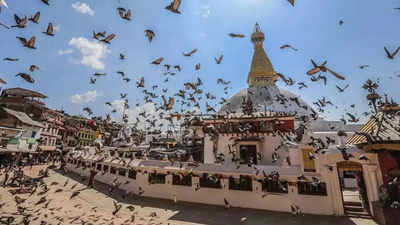
By Ashis Biswas
As both India and Bangladesh prepare to hold general elections early next year, concerned authorities are finding it extremely hard to maintain effective foodgrains supply chains and contain inflation. In addition, Nepal has been urging India to sell significant quantities of rice, wheat and paddy to meet rising demands in the coming festive season, expecting Delhi to relax its present ban on foodgrain exports, as a special measure.
The Nepalese administration, which recently sold a substantial quantity of tomatoes to its larger Southern neighbour to help stabilise or lower crop prices, recently ranging between Rs 140/200 in most Indian States, id hopeful that India would reciprocate its gesture.
Rising costs of food items as well as fuel, contributing to existing inflationary trends, still remain major worries among India’s regional neighbours. The ruinous effects of global warming, accompanied by excessive heating and erratic as well as declining rains, have impacted crop productions in most places. Food supply chains worldwide had already been disturbed by the Ukraine war, which shows no signs of ending soon. Without major grains and related imports from India, Nepal and Bangladesh face the dire possibility of already high prices rising further, fuelling a massive inflation.
Bangladesh has been in urgent talks with Russia and Myanmar, to ensure a guaranteed supply of rice and wheat for the short and medium term. Reports from Dhaka suggest that the country’s existing stock position is healthy. But by early 2024, when elections will be held, present reserves would run out.
Both Russia and Myanmar have mentioned selling prices that Bangladesh finds too high. Myanmar again is not certain it can meet Dhaka’s grains demands in full. Given the difficult economic situation prevailing worldwide, it is clear that more negotiations will be needed and it would be wise for policymakers to factor in some hardline bargaining ahead, with selling countries enjoying an edge.
No wonder Bangladesh along with Nepal, is banking on India to come to its aid big time, in a very difficult situation. Good neighbourly relations among these countries is a definite advantage. Along with Sri Lanka and China, Bangladesh and Nepal have been regular importers of rice produced in India, during more normal times.
For instance, Nepal imported 1.4 million tonnes of Indian rice in 2021, costing $473-plus million. Bangladesh purchased 37% of its aggregate rice imports from India in 2022, spending over $2.81 million.
By end 2023 and the first quarter of 2024, however, India will have its own special compulsions to contend with. Lok Sabha elections will be due sometime close to mid 2024, according to indications. Food prices will be a major issue. Much will depend on the domestic production of rice, wheat, paddy and varieties of ‘dal’ (lentil). Present pre-harvest indications are hardly encouraging.
Beginning with the southern States, the monsoon rainfall is expected to decline in parts of East as well as central India, because of the El Nino factor. Most economists/planners therefore fear a shortfall in overall food/veg production. The reduction in quantity is likely to result in higher prices, which can be met only partially by making use of existing reserves.
The issue could well be politically sensitive as well as decisive during the long build-up period prior to the 2024 polls. India’s own economy, with present levels of unemployment, declining exports and industrial production, is not going great guns. No wonder GOI has banned its normal export of rice and sugar etc for now.
The question arises, how efficiently can GOI work out a delicate balance between maintaining effective domestic governance and meeting the desperate pleas for help from its economically distressed neighbours? Given India’s traditional role of being an acknowledged leader in the South Asian region, helping neighbours during a worldwide economic crisis is not a task to be taken lightly.
Meanwhile, judging by media reports from Kathmandu and Dhaka, policymakers do not conceal that they feel the heat, as well as the tension mounting among common people. Bangladesh Commerce Minister Mr Tipu Munshi visited India recently with a list of urgent requirements for items Dhaka wanted badly. Earlier Prime Ministers of both countries had agreed to work out a bilateral agreement that would guarantee a definite quantum of supply from India.
The compulsion in Bangladesh can be readily appreciated, given that the ruling Awami League (AL) is already engaged in a pre-poll campaign against its bitterest opponent the BNP (Bangladesh Nationalist Party). Achieving some kind of food security for Bangladesh before the polls is thus priority number one for the ruling AL, with the eyes of a hostile West already following developments very closely!
As things stand, Nepal according to media reports has pressed India to supply at least 100,000 tonnes of rice, a million tonnes of paddy and 50,000 tonnes of sugar. As for Bangladesh, it would like to import over 15,00,000 tonnes of rice, 10,00,000 tonnes of sugar and 26,00,000 tonnes of wheat . It would also require substantial amounts of garlic, ginger, onions and dal, in the near future.
Ministers and GOI officials have indicated that exporting foodgrains etc in such quantities might not be possible in the present situation, given India’s own compulsions. Both countries have been told to reduce the magnitude of their preliminary orders to the extent possible. However, India reiterated its commitment to stand by its neighbours in the hour of their need, as always.
Bangladesh has already submitted a revised list of requirements from India following the recent talks. But along with Nepal it still counts on India to come to its help in a major way. (IPA Service)
The post Bangladesh And Nepal Look To India For Emergency Foodgrains Supply first appeared on Latest India news, analysis and reports on IPA Newspack.


